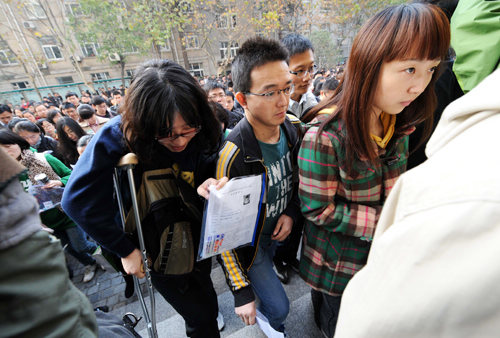|
 |
|
FIERCE COMPETITION: College graduates take part in the civil service recruitment exam in Nanjing, Jiangsu Province, on November 27, 2011 (SUN CAN) |
Three HIV-carriers wrote a joint letter to the Legislative Affairs Office of the State Council, China's cabinet, on November 28, 2011, calling on the government to repeal discriminatory administrative regulations that prevent people with HIV from entering the civil service.
The regulations they are seeking to amend include the General Civil Service Recruitment Physical Examination Criteria, the Civil Service Special Physical Examination Criteria and the Measures for the Implementation of the Law on the Prevention and Treatment of Infectious Diseases.
China's Employment Promotion Law, as well as the Regulations on the Prevention and Treatment of HIV/AIDS, guarantee HIV-positive people's right to work.
However, the three petitioners, from Anhui, Sichuan and Guizhou provinces respectively, said they were wrongly denied teaching jobs because mandatory blood tests revealed they were HIV positive, even though they had passed written tests and interviews.
They filed separate lawsuits against their local governments after provincial education authorities rejected their applications for teaching jobs.
Courts ruled against the claims of the persons in Anhui and Sichuan in 2010.
In the third lawsuit filed in Guizhou Province, a judge told the plaintiff last October the court would not accept the lawsuit and suggested that he turn to the local government to solve the issue.
In their letter, the three petitioners also accused existing regulations of enforcing isolation during the treatment of people living with HIV/AIDS, which they said is "a serious violation of medical common sense."
This high-profile appeal has drawn attention to the much broader problem of discrimination in China's civil service recruitment.
On November 22, 2011, the Constitutionalism Research Institute of the Beijing-based China University of Political Science and Law released a report after studying recruitment requirements for 9,762 government jobs offered in 2011. It is the second annual report of this kind released by the institute, following the first one in 2010.
The report garnered wide media interest as the civil service is considered a prime career for many of China's college graduates.
A total of 970,000 applicants took the exam for civil service recruitment across the country on November 26 and 27, 2011. They competed for only 18,000 posts in central and local government departments.
According to the report, limits in terms of age, gender and health conditions are common in advertised positions.
For example, the 92 positions offered by the civil aviation air police corps required candidates to be under the age of 28. A few specialized positions were reserved only for doctorate holders and/or candidates no older than 40 years old. In addition, 0.4 percent of total posts required candidates to possess certain physical characteristics, such as height.
In fact, even the civil service recruitment exam restricted eligibility to Chinese nationals aged from 18 to 35, though no evidence suggests people aged above 35 cannot be competent enough to become civil servants.
Vacancies in which successful candidates were, allegedly, recruited based on their gender increased from 1,203 in 2010 to 1,519. "These vacancies were mostly reserved for men, or the job descriptions suggested that only men should apply," the report says.
The health criteria for civil service recruitment also automatically disqualify people living with HIV/AIDS. However, according to the report, the consensus among medical experts is that HIV-carriers are just as able as healthy people and should not be excluded from the recruitment process.
In addition to age, gender and health conditions, the report also cites numerous instances of discrimination on grounds of political and residential origin, including where an applicant was born and where his or her permanent residence is registered.
According to the report, 19.1 percent of posts required membership of the Communist Party of China or the Communist Youth League, 15.6 percent required candidates to be a certain gender, and 11.5 percent had requirements based on residential status.
| 